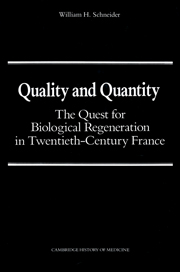Book contents
- Frontmatter
- Contents
- Preface
- 1 Introduction
- 2 Degeneration and regeneration
- 3 From puericulture to eugenics
- 4 The French Eugenics Society up to 1920
- 5 Postwar eugenics and social hygiene
- 6 The campaign for a premarital examination law
- 7 French eugenics in the 1930s
- 8 Eugenics, race, and blood
- 9 Race and immigration
- 10 Vichy and eugenics
- 11 Conclusion
- Notes
- Selected bibliography
- Index
7 - French eugenics in the 1930s
Published online by Cambridge University Press: 10 March 2010
- Frontmatter
- Contents
- Preface
- 1 Introduction
- 2 Degeneration and regeneration
- 3 From puericulture to eugenics
- 4 The French Eugenics Society up to 1920
- 5 Postwar eugenics and social hygiene
- 6 The campaign for a premarital examination law
- 7 French eugenics in the 1930s
- 8 Eugenics, race, and blood
- 9 Race and immigration
- 10 Vichy and eugenics
- 11 Conclusion
- Notes
- Selected bibliography
- Index
Summary
It is clear by now that eugenics in France was hardly a static, unchanging movement. Even in the few decades since its formulation at the turn of the century, it was in an almost constant state of flux due to changes both in French society and the sciences upon which eugenics was based. Yet one can discern certain major turning points that help in understanding the broader development of the history of French eugenics. The First World War was one such turning point, and in many ways the 1930s was an equally profound if less abrupt juncture.
The most important reasons for the second turning point were undoubtedly the Depression and the rise to power of the Nazis in Germany. But also important for the history of eugenics was the proclamation of Pius XI's encyclical, Casti conubii [On Christian marriage] in December 1930, which specifically condemned eugenic practices. Although the effects of the Depression were ambiguous and complex, the actions of the Nazis in power and the results of the encyclical quickly sharpened the line of debate about eugenics in France, where definitions had always been fuzzy. For example, after the papal pronouncement, the full weight of the Catholic church was unmistakably opposed to eugenics, whereas the passage of Nazi eugenic laws beginning in 1933 put a eugenics program into effect for the first time on a national scale – for Europeans and the world to see. This chapter will examine the impact of these developments, which originated outside France, and it will also look at changes in the people and institutions within the country that made the nature of eugenics in the 1930s very different from previous years.
- Type
- Chapter
- Information
- Quality and QuantityThe Quest for Biological Regeneration in Twentieth-Century France, pp. 170 - 207Publisher: Cambridge University PressPrint publication year: 1990

